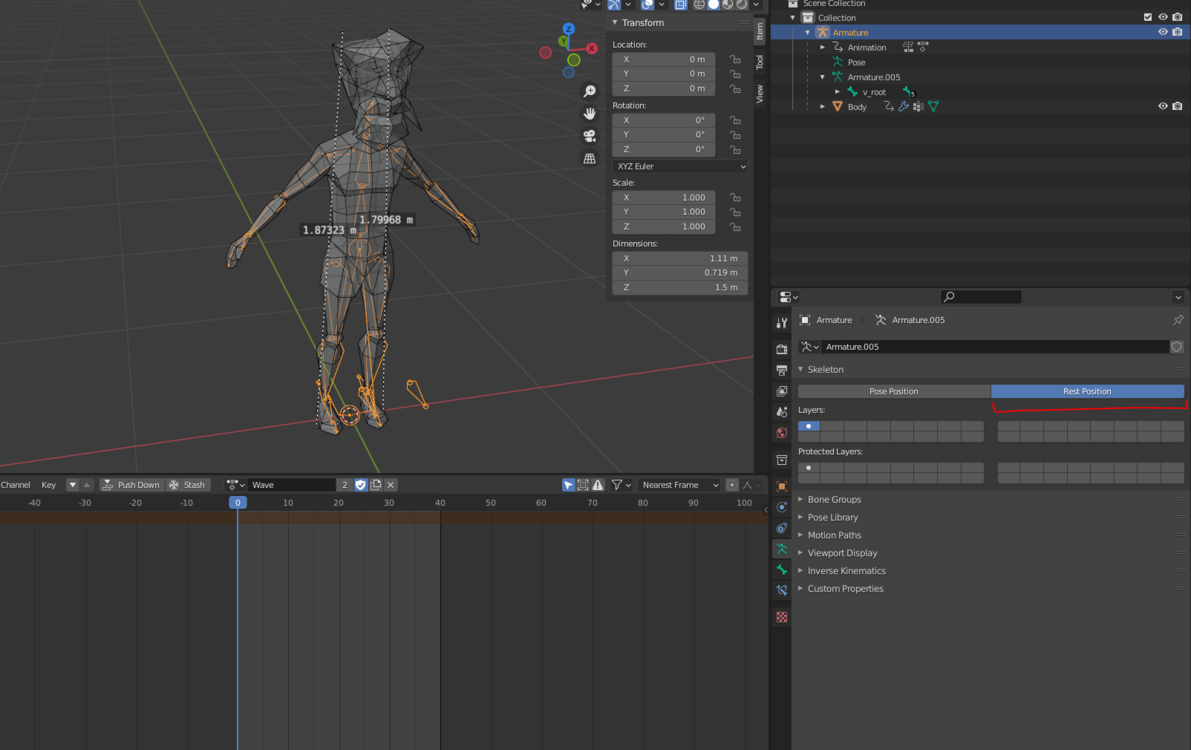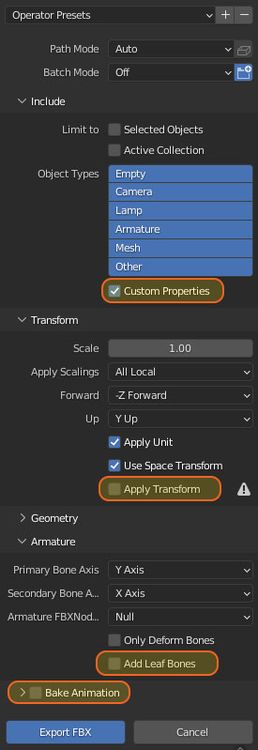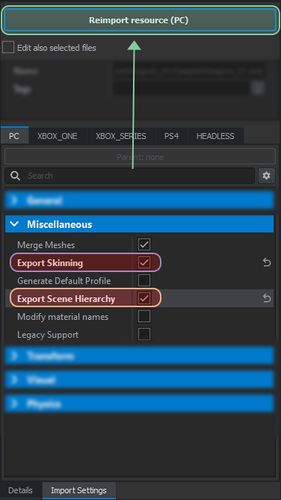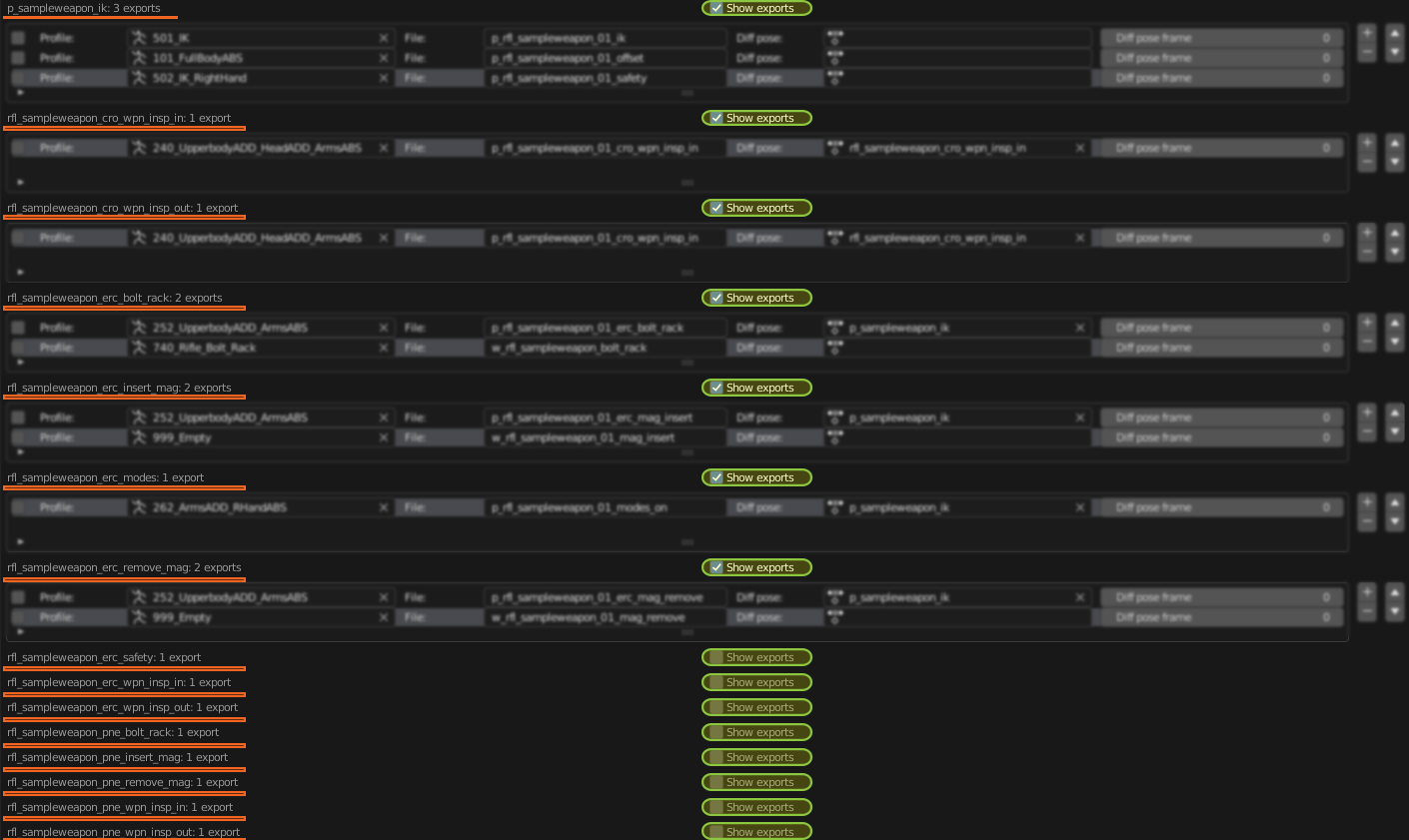Reyhard/Sandbox – User
Animations for Enfusion are exported into an intermediate human-readable format TXA. This format needs to be further compiled by the Enfusion engine into ANM - a binary format used during the runtime.
APR files are used for animations export. These files contain export profiles. Profiles can be found in
anims. The export profile defines which bones to export and how to export them. Export profiles have to correspond with the used skeleton in the take.
It exports animation data for Enfusion. To have an animation created in Blender in Enfusion, follow these steps:
- Export the FBX model from Blender with an armature matching the animation you want to export
- Import the FBX model into Enfusion
- Export the animation from Blender (TXA format)
- Import the animation TXA file into the Enfusion
FBX
Export FBX from Blender
Set the pose mode to rest for a given skeleton to export the rig. When exporting this FBX, make sure that you uncheck Add leaf bones option.
Import FBX to Enfusion
 Import the model "As Model" and afterwards set import to import skinning too.
Import the model "As Model" and afterwards set import to import skinning too.
Animation
Export Animation from Blender
TXA Export is available in top section of 3D viewport if you have at least one Armature & one Action present in the current scene. From that top bar, select Enfusion Tools -> Export -> Enfusion Animation (.txa) to initiate animation export.
Once that button is pressed, following window should be visible:
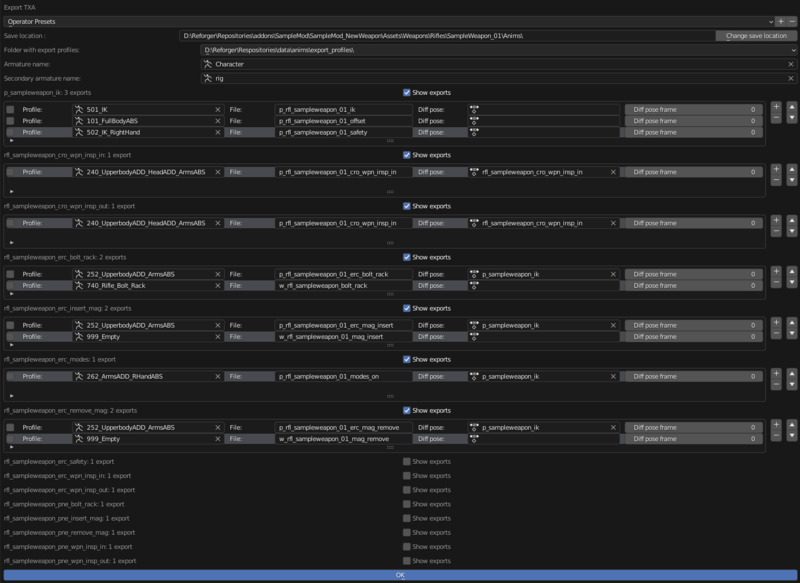
Top section
Top section contains following things:
- Save location - folder where the exported actions will be stored
- Folder with export profiles -
- Armature name - name of the armature which will be used for export. Bone transformations from this armature are processed by the exporter and stored in exported TXA file. In
- Secondary armature name (optional) - name of the secondary armature which will be used during export . This is parameter is useful when armature, which you want to transform, is constrained to another armature. In case of Rigify rig, in this field should be selected name of the Rigify control rig.
Action list
Action list contains actions found in the scene. Actions marked as assets are hidden from this list. Each individual action has Show exports checkbox, which controls the visibility of Action export list - this option is quite useful when dealing with large amount of actions like on example picture above.
Action export list
Action export list is the hear of TXA exporter. Over there you can add define how given action will be exported. New
- Enable checkbox - control if this export is active or not. In inactive state no txa will be generated
- Profile - animation export profile which will be used on this export
- File - name of resulting txa file
- Diff pose (optional) - name of the action which will be used as difference target for additive transformations. If you are using animation profile which doesn't have any additive transformations, you can leave that field empty
- Diff pose frame (optional) - frame
In export section all animation takes related to selected Armature (picked in Armature name option) should be listed. By clicking on Show exports checkbox next to desired action name, it is possible to enable export of that animation and further define what action should be exported.
In export options section it is possible to change following things:
- Pick animation export profile. All the profiles have to be in anims
\export_profiles or in a subdirectory. By default, assuming Enfusion Blender Tools Data was correctly installed, there should be dozens of available animation exports which were used on Reforger assets. Selected profile has to correspond with the skeleton - otherwise no animation will be exported. - Select animation for difference animations. This is only used if additive animation export profile is used.
- Change file name of exported animation. If this field is empty, plugin will use action name for creation of new txa
Location of where TXA files will be generated can be changed by selecting different directory in the save location field in the top section of export window.
Once all desired animation actions are selected and properly configured for export (meaning they have correct animation export profile selected), it is now possible to finally perform export to TXA. To do so, press Export TXA button in bottom right section of the export window.
Default Profile
If you create a new rig, you will need to create a new set of export profiles for it. As this can get tedious, you can generate a new export profile from the Workbench:
in the model's import settings, check the "Generate Default Profile" option that will generate a sample profile. This default profile will export the transformation and rotation of each bone as absolute values. You can build your own profiles based on this profile.
Import Animation to Enfusion
Once TXA is generated, there are two ways how to convert TXA into .ANM file:
- Drag and drop the TXA file into the Resource Browser.
- Click on TXA with Right Mouse Button and select "Register and Import" option from the Context Menu.
Once animation is imported, .ANM file will be automatically regenerated every time Workbench detects change in .TXA. If TXA was modified when Workbench was closed, manual reimport might be necessary.
